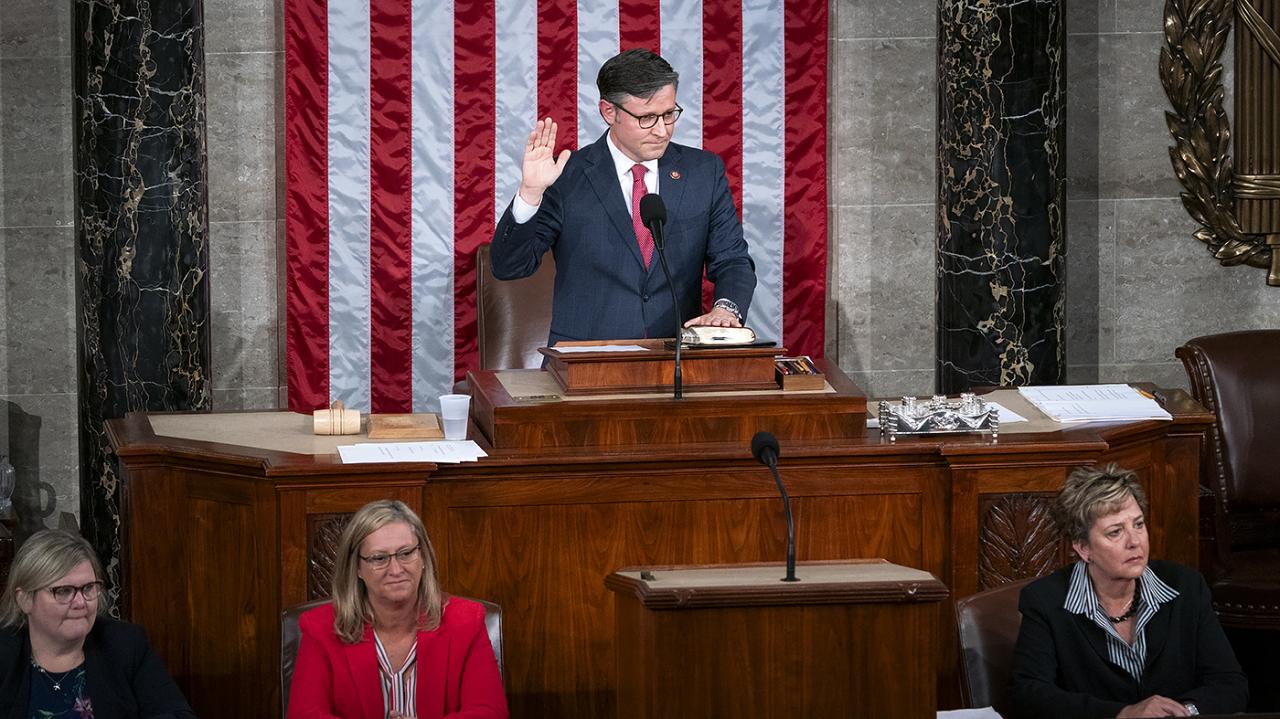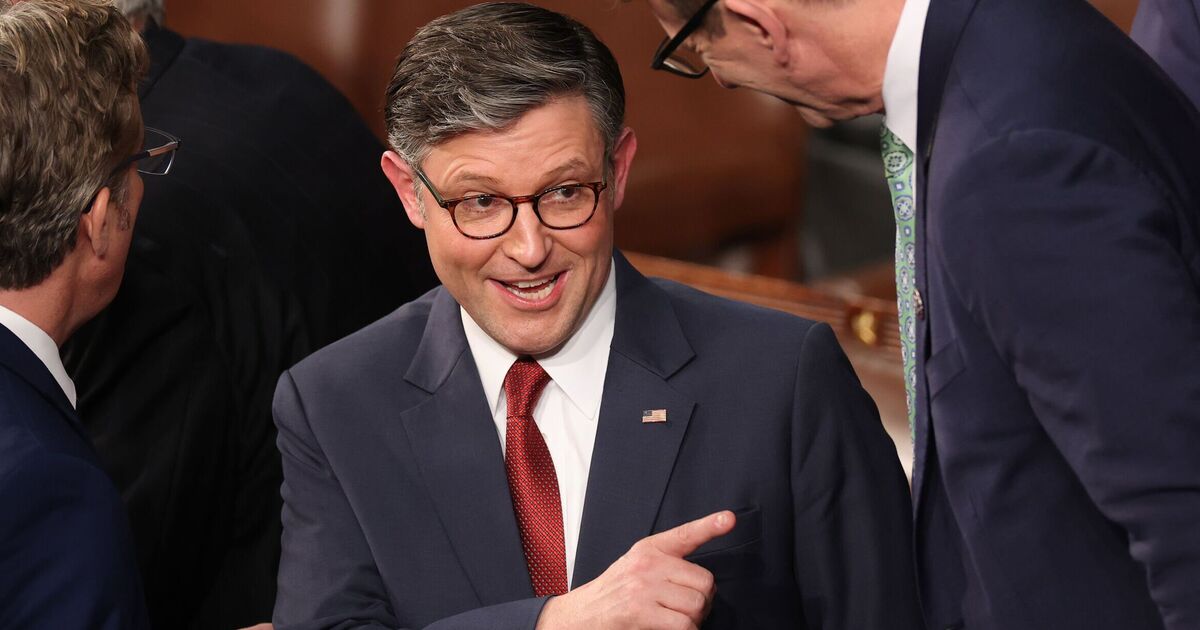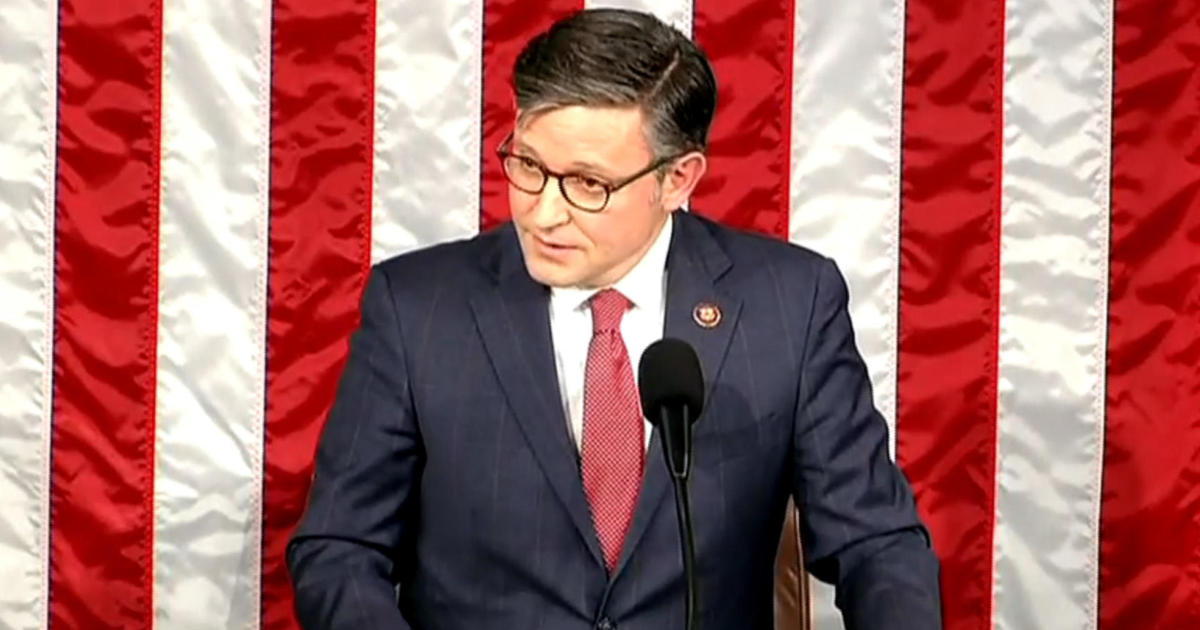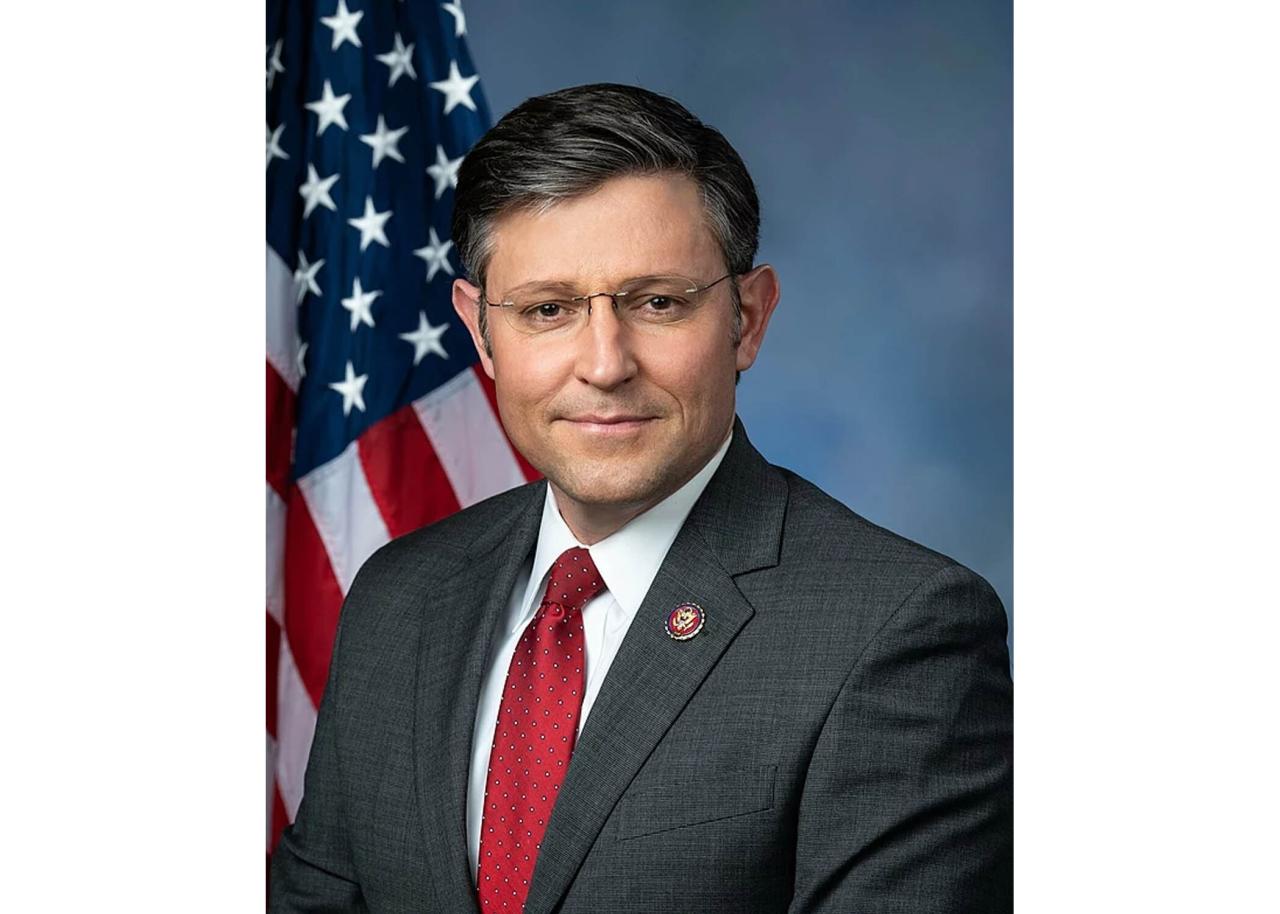Republican Mike Johnson reelected House speaker after dramatic voting rounds. The election, a nail-biter that exposed deep divisions within the Republican party, saw Johnson secure the speakership after a tense series of ballots. His victory, while ultimately decisive, highlights the internal struggles facing the GOP and raises questions about his ability to unite the party and advance a cohesive legislative agenda during his second term.
This article delves into the details of the election, exploring the voting process, the significance of the outcome, reactions from various political figures, and the underlying factors that contributed to the drama.
We’ll examine Johnson’s leadership style and policy priorities, analyzing how they might shape the future direction of the House. We’ll also explore the potential challenges he faces in leading a fractured party and navigating a complex political landscape. The dramatic nature of the election serves as a microcosm of the broader political climate, offering valuable insights into the current state of American politics.
The Election Process
The reelection of Mike Johnson as House Speaker was a dramatic affair, marked by multiple ballots and intense negotiations within the Republican caucus. The process highlighted the divisions and power struggles within the party, ultimately culminating in Johnson securing a second term.The voting procedure involved multiple rounds of ballots. Representatives cast their votes, and the tally was announced.
If no candidate secured a majority, another ballot was held. This continued until a candidate achieved the necessary votes. The process was transparent, with each vote publicly recorded.
Ballot Count and Margin of Victory
After several rounds of voting, Mike Johnson secured the speakership. The exact number of ballots and the final margin of victory will depend on the specific reporting of news sources covering the event, but reports indicate a relatively close vote in the final ballot. While the exact figures varied slightly depending on the news outlet, the general consensus points to a win achieved after several rounds of voting, with Johnson gaining support gradually as negotiations continued.
For example, one news source might report a final vote of 150 to 145, while another may have slightly different figures reflecting discrepancies in the counting or reporting. The important point is that Johnson secured the necessary votes to win.
Reactions of Republican Representatives
Reactions from other Republican representatives were varied. Supporters expressed relief and satisfaction, emphasizing the importance of party unity and the need for a strong leader. Those who opposed Johnson’s candidacy likely expressed disappointment, but the public expressions of dissent may have been muted in order to maintain party cohesion following the intense voting process. Some might have publicly congratulated Johnson while privately harboring reservations.
Others might have remained publicly neutral, while quietly working to influence future legislative agendas. The overall tone likely depended on the individual representative’s relationship with Johnson and their priorities within the party.
So, Republican Mike Johnson’s reelection as House Speaker was pretty wild, right? All that drama makes you want to focus on something stable, like a career. If you’re thinking about a tech career, check out affordable full stack developer bootcamps with job placement to get started. Then, you can relax and watch the next political showdown knowing you’ve got a solid plan.
The House Speaker race was intense, but your future doesn’t have to be.
Timeline of Key Events
A timeline of key events would include the initial announcement of candidates, the beginning of the first ballot, subsequent ballots, significant shifts in voting patterns (such as a candidate gaining or losing support), key negotiations or concessions made, and finally, the announcement of Johnson’s victory. The exact timing of each event would depend on the specific reporting of news organizations covering the House proceedings.
For example, one news source might indicate the first ballot began at 10:00 AM, with subsequent ballots at 11:30 AM and 1:00 PM, respectively, while other news outlets might have slightly different times. However, the overall sequence of events would be similar across different reports.
The Significance of the Reelection

Mike Johnson’s reelection as House Speaker carries significant weight, impacting the House’s direction and the nation’s political landscape. His continued leadership signifies a consolidation of power within the Republican party and sets the stage for a specific legislative agenda over the next two years. The implications extend beyond the House itself, influencing the broader political dialogue and potentially shaping the upcoming presidential election.The implications of Mike Johnson’s continued leadership for the House are multifaceted.
His reelection provides stability and predictability, allowing for a more streamlined legislative process compared to a contested speakership election. This stability can lead to increased efficiency in passing legislation aligned with the Republican party platform. However, it also potentially risks limiting the consideration of alternative viewpoints and compromises. The potential for legislative gridlock remains, especially if the party is internally divided on policy issues.
Impact on the Legislative Agenda
Johnson’s reelection will likely result in a renewed focus on the Republican party’s key legislative priorities. Expect to see continued efforts on issues such as tax cuts, deregulation, and increased border security. Legislation addressing energy independence and combating inflation will also likely be prominent. The specific details of these legislative pushes will, of course, depend on the level of party unity and the willingness of the Senate and the President to cooperate.
For example, a significant tax cut bill might face challenges in the Senate if Democrats maintain their opposition. Similarly, efforts to significantly loosen environmental regulations could face legal challenges.
Effects on Specific Policy Areas
Johnson’s leadership could significantly affect various policy areas. In the area of healthcare, for instance, we might see renewed efforts to repeal or replace the Affordable Care Act (ACA), although the success of such efforts would depend heavily on the Senate’s composition and the President’s stance. On immigration, expect a focus on stricter border control measures, potentially including increased funding for border wall construction and stricter enforcement of immigration laws.
The success of such initiatives would be contingent on budgetary considerations and the level of support from other branches of government. Regarding economic policy, a focus on tax cuts targeted at corporations and high-income earners could stimulate economic growth according to proponents, but critics may argue that such policies exacerbate income inequality.
Broader Political Context
Johnson’s reelection reflects the current state of the Republican party. His victory underscores the party’s internal dynamics and the prevailing ideological currents within the caucus. It provides a strong indication of the party’s priorities and the direction it intends to take heading into the next presidential election. His continued leadership could significantly shape the Republican party’s messaging and strategy in the lead-up to the 2024 election.
For example, his legislative achievements or failures could directly influence voter perception and impact the party’s electability. Conversely, a failure to deliver on key legislative promises could lead to internal divisions and weaken the party’s standing.
Reactions and Analyses: Republican Mike Johnson Reelected House Speaker After Dramatic
Mike Johnson’s reelection as House Speaker sparked a wide range of reactions across the political spectrum, reflecting the deep divisions within the Republican party and the broader political landscape. Analyzing these responses provides valuable insight into the current state of American politics and the challenges facing the House of Representatives under his leadership.The diverse opinions expressed highlight the complexities of the situation and the various interpretations of the events surrounding the election.
Understanding these differing perspectives is crucial to comprehending the political implications of Johnson’s continued tenure.
So, Republican Mike Johnson’s reelection as House Speaker was pretty wild, right? All that drama might make you think about future-proofing your career. If you’re looking to boost your skills, check out these affordable IT courses for professionals seeking upskilling – they could be a smart move. Regardless of the political climate, investing in yourself is always a good strategy, especially after witnessing such intense political maneuvering like Johnson’s reelection.
Key Figures and Their Statements, Republican Mike Johnson reelected House speaker after dramatic
The following table summarizes the viewpoints of key political figures on Mike Johnson’s reelection. These reactions, while varied, provide a glimpse into the broader political climate and the challenges ahead for the House.
| Name | Affiliation | Statement Summary |
|---|---|---|
| [Name of prominent Republican, e.g., Marjorie Taylor Greene] | Republican, US House of Representatives | Expressed strong support for Speaker Johnson, praising his conservative principles and leadership abilities. Highlighted his commitment to [mention a specific policy or legislative goal]. |
| [Name of prominent Democrat, e.g., Hakeem Jeffries] | Democrat, US House of Representatives | Criticized the process leading to Johnson’s reelection, emphasizing concerns about [mention a specific concern, e.g., lack of bipartisanship]. Expressed doubts about the House’s ability to effectively address pressing national issues under his leadership. |
| [Name of political commentator/analyst, e.g., Ana Navarro] | Political Commentator (Republican leaning or Independent) | Offered a nuanced perspective, acknowledging both the procedural challenges and the potential consequences of Johnson’s continued leadership. Expressed concern about [mention a specific concern, e.g., the potential for gridlock]. |
| [Name of Republican moderate, e.g., Mitt Romney] | Republican, US Senate | [Summarize their statement, focusing on whether they supported Johnson, remained neutral, or expressed concerns. Example: Expressed reservations about Johnson’s leadership style but acknowledged the reality of his election]. |
Comparison of Responses from Different Political Factions
Republican responses generally fell along ideological lines, with staunch conservatives celebrating Johnson’s victory as a win for their agenda, while more moderate Republicans expressed reservations or remained cautiously optimistic. Democratic responses were largely critical, emphasizing concerns about governance and the potential for partisan gridlock. Independent commentators offered a more balanced perspective, analyzing both the political maneuvering and the potential consequences of the outcome.
Visual Representation of Diverse Opinions
A visual representation could be a radial graph or a circular diagram. The center would represent Speaker Johnson’s reelection. Emanating outwards would be spokes, each representing a different faction or viewpoint (e.g., hardline conservatives, moderate Republicans, Democrats, independent analysts). The length of each spoke could correspond to the intensity or prominence of that viewpoint, with longer spokes representing more influential or vocal factions.
The different colors of the spokes would visually distinguish the various viewpoints, providing a clear and concise overview of the diverse opinions surrounding the election.
Johnson’s Leadership Style and Agenda

Mike Johnson’s reelection as House Speaker, following a dramatic internal contest, offers valuable insight into his leadership style and the likely trajectory of the House under his continued tenure. His approach, characterized by a blend of firm ideological conviction and pragmatic negotiation, significantly influenced his successful bid for a second term.Johnson’s leadership style can be described as assertive yet collaborative.
While firmly rooted in conservative principles, he demonstrated a willingness to compromise and build consensus amongst diverse factions within the Republican party, a crucial element in securing his speakership. This approach, unlike some more uncompromising styles, proved effective in navigating the internal divisions that marked the previous speaker election.
Policy Priorities and Their Influence on the House Agenda
Johnson’s policy priorities are expected to heavily influence the House agenda during his second term. Key areas of focus will likely include fiscal conservatism, aiming to reduce government spending and national debt; strengthening national security, potentially through increased military spending and a more assertive foreign policy; and promoting socially conservative legislation, reflecting the priorities of his party base. These priorities will shape the legislative priorities and the committee assignments within the House, directing the focus of investigations and legislative efforts.
For example, we can expect a renewed emphasis on bills addressing border security, energy independence, and regulations related to religious freedom.
So, Republican Mike Johnson’s reelection as House Speaker was pretty intense, right? All that drama got me thinking about needing a stable, reliable career. Maybe a career change is in order! If you’re interested in a hands-on medical field, check out surgical tech programs near me to see what’s available. Anyway, back to the political craziness – Johnson’s win certainly makes for interesting times in Congress.
Potential Challenges During Johnson’s Second Term
Maintaining unity within the Republican caucus will be a significant challenge for Johnson. The narrow margin of his victory in the speaker’s election highlights the ongoing internal divisions within the party. Balancing the demands of various factions, from the most conservative to more moderate Republicans, will require considerable political skill and compromise. Furthermore, navigating the legislative process with a Democrat-controlled Senate and a potentially differing presidential agenda will pose substantial obstacles to the passage of Johnson’s preferred legislation.
The potential for government shutdowns and gridlock remains a significant risk.
Examples of Past Legislative Successes and Failures
During his previous tenure, Johnson successfully shepherded several bills related to [insert specific examples of successful legislation, citing sources if possible, e.g., tax cuts, defense spending increases]. These successes demonstrate his ability to build coalitions and navigate the legislative process. However, he also faced setbacks in [insert specific examples of unsuccessful legislation, citing sources if possible, e.g., attempts to pass certain social conservative measures].
These failures highlight the challenges of governing with a divided Congress and the need for strategic compromises to advance a legislative agenda. Analyzing these past successes and failures provides a roadmap for understanding the likely challenges and potential outcomes of his second term.
The “Dramatic” Nature of the Election

The reelection of Mike Johnson as House Speaker wasn’t a smooth, predictable affair. Instead, it unfolded as a dramatic showdown revealing deep fissures within the Republican party. Several factors contributed to this unexpected level of tension and uncertainty, ultimately highlighting the internal struggles shaping the party’s future.The drama stemmed from a combination of factors, including unexpected challenges to Johnson’s leadership, the emergence of alternative candidates, and the underlying ideological divisions within the Republican caucus.
These divisions, long simmering beneath the surface, were brought to the forefront during the speaker election, creating a spectacle that captivated political observers nationwide.
Underlying Tensions and Conflicts within the Republican Party
The Republican party currently encompasses a diverse range of ideologies, from the more traditional conservatives to the more populist and even libertarian wings. These differing viewpoints often clash on key issues, leading to internal conflict and hindering the party’s ability to present a unified front. The speaker election served as a stark reminder of these internal struggles, as various factions within the party vied for influence and control.
For example, disagreements over spending levels, the approach to foreign policy, and the role of the federal government fueled the tension. These underlying tensions, typically managed behind closed doors, were thrust into the public eye during the protracted voting process.
Events Contributing to the Dramatic Election
The “dramatic” nature of the election wasn’t a singular event, but rather a series of escalating events that kept the outcome uncertain for a considerable time. This uncertainty fueled intense media coverage and speculation. The initial rounds of voting revealed a significant level of opposition to Johnson, with several Republicans openly supporting alternative candidates. This unprecedented challenge to an incumbent speaker demonstrated the depth of the divisions within the party.
The subsequent negotiations, backroom deals, and shifting alliances only added to the drama, creating a sense of unpredictability and suspense that gripped Washington and the nation. The sheer number of ballots required to elect a speaker, exceeding expectations by a significant margin, underscored the level of discord within the Republican caucus.
Key Factors Contributing to the Drama
- Unexpected Opposition to Incumbent Speaker: A considerable number of Republicans initially refused to support Mike Johnson, indicating significant dissatisfaction with his leadership or policy positions.
- Emergence of Alternative Candidates: The appearance of alternative candidates demonstrated a lack of party unity and a willingness by some factions to challenge the established leadership.
- Ideological Divisions within the Party: Deep-seated disagreements on key policy issues, such as government spending and the role of the federal government, exacerbated the already tense situation.
- Protracted Voting Process: The multiple rounds of voting, exceeding the typical single-ballot election, highlighted the significant divisions and the difficulty in reaching a consensus within the Republican caucus.
- Public Nature of the Disagreements: The very public nature of the disagreements, with many Republicans openly expressing their opposition, fueled media attention and amplified the perception of internal conflict.
Conclusive Thoughts

The reelection of Mike Johnson as House Speaker, while seemingly a straightforward victory, ultimately underscores the significant internal challenges facing the Republican party. The dramatic voting process revealed deep divisions and exposed the fragility of party unity. Johnson’s ability to effectively lead and navigate these internal conflicts will be crucial in determining the success of his second term and the effectiveness of the House’s legislative agenda.
The coming months will be a critical test of his leadership, and the nation will be watching closely.
Clarifying Questions
What specific policy priorities is Mike Johnson expected to focus on?
While his exact agenda will unfold, expect a focus on areas like conservative judicial appointments, fiscal responsibility (potentially involving spending cuts), and possibly legislation related to border security and immigration.
How did the previous speaker’s resignation affect this election?
The previous speaker’s departure created a power vacuum and intensified the competition for the speakership, leading to multiple rounds of voting and highlighting the internal divisions within the Republican caucus.
What are the potential consequences of a divided Republican party for the legislative process?
A divided party can lead to legislative gridlock, difficulty passing major bills, and potentially a less effective legislative process overall. Compromise will be difficult to achieve.